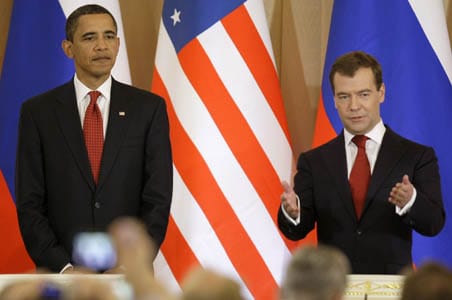
President Barack Obama and Russian President Dmitry Medvedev signed a preliminary agreement on Monday to reduce the world's two largest nuclear stockpiles by as much as a third, to the lowest levels of any US-Russia accord, and counter what Obama called "a sense of drift" in the countries' relations.
"We must lead by example, and that's what we are doing here today," Obama declared in Kremlin hall glittering in gold. "We resolve to reset US-Russian relations so that we can cooperate more effectively in areas of common interest."
The document signed by the two leaders at a Moscow summit, Obama's first in Russia, is meant as a guide for negotiators as the nations work toward a replacement pact for the START arms control agreement that expires in December.
The joint understanding also commits the updated treaty to lower longer-range missiles for delivering nuclear bombs to between 500 and 1,100. The limit for warheads would be in a range of 1,500 to 1,675 each.
However, there are disagreements on what to count. Medvedev called Monday's agreement a "reasonable compromise."
Between them, the two countries possess more than 90 per cent of the world's nuclear weapons. Under current treaties, each country is allowed a maximum of 2,200 warheads and 1,600 launch vehicles.
A White House statement said the new treaty "will include effective verification measures" and Obama said definitively the new treaty would be completed by the end of the year.
The 1991 Strategic Arms Reduction Treaty, or START, led each country to cut its nuclear warheads by at least one-quarter, to about 6,000. The 2002 Treaty of Moscow called for further cuts to between 1,700 and 2,200 operationally deployed warheads by 2012.
But Moscow and Washington have long argued over what weapons should be subject to cuts.
Russia wants to limit missiles, bombers and submarines along with nuclear warheads, just as the original START treaty did. The 2002 agreement applied only to warheads. Also, the United States has been prepared to count only the warheads ready for launch, while Russia wants to count those in storage as well.
The two leaders appeared together at a news conference in a gilded and columned Kremlin hall, where they and other officials from both countries signed and exchanged documents with great flourish and much handshaking.
Among the side deals meant to sweeten Obama's two days of talks here and show progress toward improving badly damaged US-Russian relations was permission from Moscow for the United States to transport arms across its land and airspace into Afghanistan for the war there. The White House says the deal will save the US $133 million a year, by waiving transit fees and shortening flying time.
They outlined other areas in which they said their countries would work together to help stabilize Afghanistan, including increasing assistance to the Afghan army and police, and training counter-narcotics personnel.
A joint statement said that they welcomed increased international support for upcoming Afghan elections and that they were prepared to help Afghanistan and Pakistan work together against the "common threats of terrorism, extremism and drug trafficking."
Among other agreements was the resumption of military cooperation, suspended after Russia invaded neighboring Georgia last August and sent relations into a nosedive.
The White House announced that the two nations plan 20 exchanges and meetings this year. For example, Russian military cadets will come to the US Military Academy at West Point. The two countries also plan a joint exercise concerning responses to possible plane hijackings.
They also promised fresh cooperation on public health issues and revived a joint commission to try to account for missing service members of both countries dating back to World War II.
The commission was first created by the first President Bush and President Boris Yeltsin in the early 1990s, but the Russians later downgraded their participation.
The US hope is that the Russians will now open some of their more sensitive archives to US researchers seeking details about missing American servicemen.
Track Latest News Live on NDTV.com and get news updates from India and around the world

